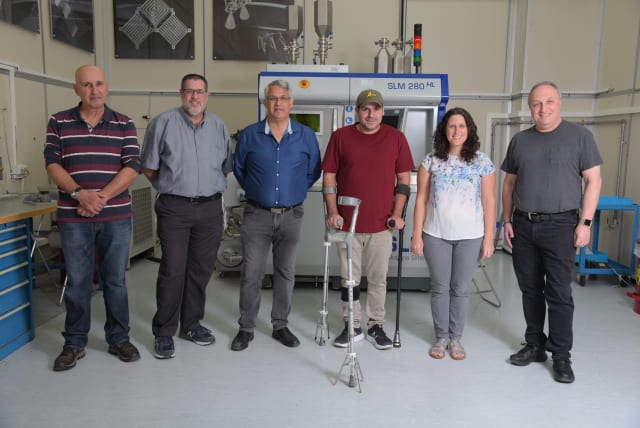'Hands-free' crutches stand their own for injured IDF soldiers

IAI and TOM organizations develop new solutions for wounded soldiers that can be given to civilians.
Israel Aerospace Industries (IAI) engineers participated in a joint project with Tikkun Olam Makers (TOM) to develop an advanced solution to the challenges faced by injured IDF soldiers.
One of the participants of the project, 35-year-old Motti Elmaliach, suffered multiple injuries during his service in the Border Police.
“I’m suffering from several difficulties – an injury in my right leg, a damaged nervous system, and PTSD,” said Elmaliach. “I use crutches, and asked the engineers for special ones that could stand up by themselves. After a month and a half, they already had a prototype to show me.”
Dana Falnner Derech, head of IAI social services, said that “three years ago, we participated in Good Deeds Day and saw that engineers, who do very complex things on a daily basis, can develop products that will change the lives of people with disabilities. After that day I said to myself: ‘Why should we do it only once a year?’ And then I made this project. There was a huge following, and these days we’re on the second cycle of the project. We’re working with eight injured soldiers with various difficulties to which there are no market solutions that can help them, or there is one and it’s prohibitively expensive.”
According to Falnner Derech, the engineers created cheap and easy solutions for tailored needs. “Once that’s done, we put the specs on the Internet so that people all over the world who suffer from the same problems can create the devices,” said Falnner Derech. “We’re working with the TOM, which allows this platform. There are no registered patents here or anything like that, but just over 100 people [in the current cycle] who volunteer to make a change for the better in others’ lives.”
Uri Avihil, an engineer who worked on the Beresheet lunar spacecraft at IAI, is one of the leaders of the teams.
“It all started with an email we revived, where we were asked who was willing to volunteer,” he said. “Since I was on a previous project in which we helped special needs kids, I knew the concept and the challenges we would face on the technological level. On my team we have 10 people from different fields, and each contributes what they can.”
Explaining the work process, Avihil said that “at first we met with Motti Elmaliach to understand what it is he is facing. We had a long conversation and then started work, as well as letting him know what was going on every step of the way.”
The engineer spoke about what it is they were making: “He [Elmaliach] presented a few problems for us, namely that the crutches can’t stand up by themselves, so it’s a whole mess when he has to hold something with one of his arms, like a cup of coffee. If he’s sitting at a restaurant, he has to put the stilts aside on the floor so they won’t block passage ways.
“To assist Motti we built a sort of tripod that is meant to make them stand at all times. Anyone who uses crutches and saw our development said immediately that they also need something like it. Our goal here is not just helping Motti, but to make a solution for the entire public.”
Elmaliach said that he has been using crutches for seven years, “and this [new innovation] can help make me more independent, because these days I still need help lifting the crutches. This is easier and more accessible, especially if you need to hold something.”
Gidi Greenstein, founder of the TOM, added: “The products developed during IAI activities will be added to hundreds of other products developed over the last few years for the benefit of disabled people around the world. We’re proud to be partnered with IAI, and proud for the right to share these product on our website, thus allowing about a quarter of a billion disabled and elderly around the world enjoy the fruits of Israeli technological advancement.”
Jerusalem Post Store
`; document.getElementById("linkPremium").innerHTML = cont; var divWithLink = document.getElementById("premium-link"); if (divWithLink !== null && divWithLink !== 'undefined') { divWithLink.style.border = "solid 1px #cb0f3e"; divWithLink.style.textAlign = "center"; divWithLink.style.marginBottom = "15px"; divWithLink.style.marginTop = "15px"; divWithLink.style.width = "100%"; divWithLink.style.backgroundColor = "#122952"; divWithLink.style.color = "#ffffff"; divWithLink.style.lineHeight = "1.5"; } } (function (v, i) { });
